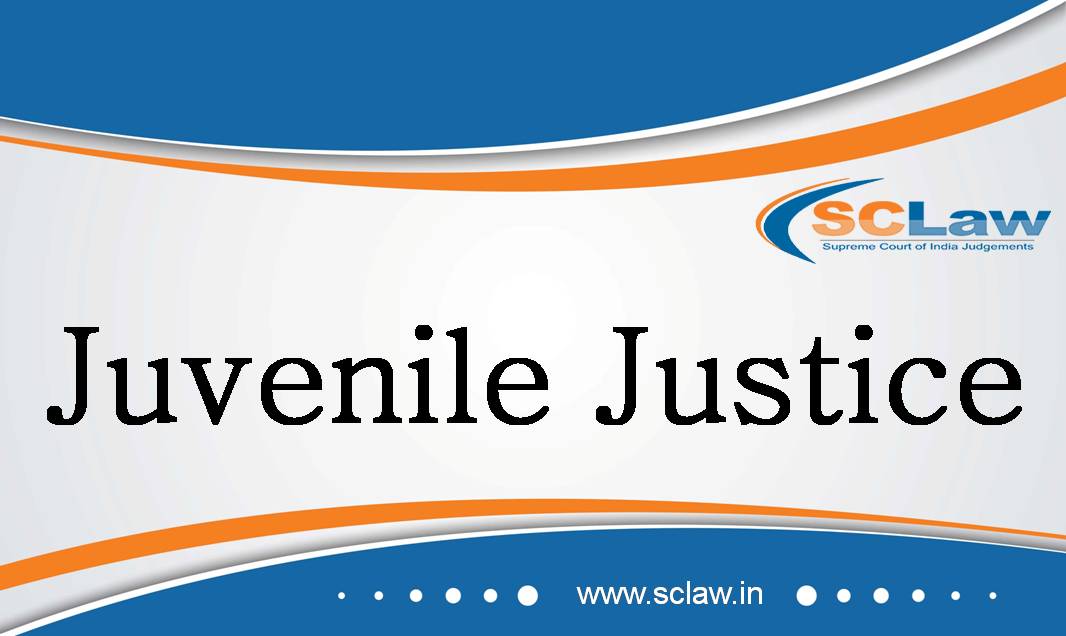IMP: Motor Vehicles Act, 1988 – Sections 140, 166 and 166(1)(c) – Fatal motor accident – Compensation Whether the major sons of the deceased who are married and gainfully employed or earning, can claim compensation under the Motor Vehicles Act, 1988? Held:- YES claimants were working as agricultural labourers on contract basis and were earning meagre income between Rs. 1,00,000/ and Rs. 1,50,000/ per annum. In that sense, they were largely dependant on the earning of their mother and in fact, were staying with her, who met with an accident at the young age of 48 years.
SUPREME COURT OF INDIA DIVISION BENCH NATIONAL INSURANCE COMPANY LIMITED — Appellant Vs. BIRENDER AND OTHERS — Respondent ( Before : A.M. Khanwilkar and Dinesh Maheshwari, JJ. ) Civil Appeal…
Commissions for Protection of Child Rights Act, 2005 – Sections 13, 13(1), 13(2), 13(1)(c), 13(1)(j), 14, 15 and 24 – Large scale trafficking of children – If the State Commission in such a case asks for assistance from the National Commission or some other State Commission where the child may have been illegally trafficked, the National Commission or the other State Commission(s) should cooperate with the Commission inquiring into the matter
SUPREME COURT OF INDIA DIVISION BENCH NATIONAL COMMISSION FOR PROTECTION OF CHILD RIGHTS AND OTHERS — Appellant Vs. DR. RAJESH KUMAR AND OTHERS — Respondent ( Before : Deepak Gupta…
SC Directs States To Appoint Exclusive Public Prosecutors In POCSO Courts HELD – POCSO cases. Sub-Section 1 of Section 32 reads as follows: “Every State must by Notification appoint a Special Public Prosecutor for every Special Court for conducting cases only under the provisions of the Act.”
SC Directs States To Appoint Exclusive Public Prosecutors In POCSO Courts [Read Order] LIVELAW NEWS NETWORK 12 Jan 2020 6:47 PM “Public Prosecutors must be trained to deal with child…
Hindu Succession -Property Of Hindu Male Undergoes Notional Partition On His Death To Devolve On Heirs; No Longer Joint Family Property
Hindu Succession -Property Of Hindu Male Undergoes Notional Partition On His Death To Devolve On Heirs; No Longer Joint Family Property : SC [Read Judgment] Manu Sebastian 11 Jan 2020…
Orissa Service Code, 1939 – Rule 72 – Departmental proceeding – Unauthorized leave overstay – In the present case, This Court are inclined to think that the respondent by remaining away from duty since 1991 to 1998 without producing contemporaneous medical record has not only been irresponsible and indisciplined but tried to get away with it by producing the certificate of a specialist Doctor who may not have treated the respondent.
SUPREME COURT OF INDIA DIVISION BENCH STATE OF ODISHA AND OTHERS — Appellant Vs. GANESH CHANDRA SAHOO — Respondent ( Before : D.Y. Chandrachud and Hrishikesh Roy, JJ. ) Civil…
Kerala Land Conservancy Act, 1957 – Section 11 – Development of resorts in two backwater islands – Both Nediyathuruthu and Vettila Thuruthu islands are backwater islands of Kerala and hence, covered by CRZ Notification of 1991
SUPREME COURT OF INDIA FULL BENCH KAPICO KERALA RESORTS PVT. LTD. — Appellant Vs. STATE OF KERALA AND OTHERS — Respondent ( Before : Rohinton Fali Nariman, Aniruddha Bose and…
IMP – KASHMIR SHUTDOWN – – Constitution of India, 1950 – Article 19(1)(a) and 19(1)(g) – Right to freedom of speech and expression – Freedom of speech and expression and the freedom to practice any profession or carry on any trade, business or occupation over the medium of internet enjoys constitutional protection under Article 19(1)(a) and Article 19(1)(g). Restriction upon such fundamental rights should be in consonance with the mandate under Article 19(2) and (6) of the Constitution, inclusive of the test of proportionality Repetitive orders under Section 144, Cr.P.C. would be an abuse of power.
SUPREME COURT OF INDIA FULL BENCH ANURADHA BHASIN — Appellant Vs. UNION OF INDIA AND OTHERS — Respondent ( Before : N.V. Ramana, R. Subhash Reddy and B.R. Gavai, JJ.…
Courts At Place Where Wife Resides After Leaving Matrimonial Home Can Entertain Complaints U/s 498A IPC
Courts At Place Where Wife Resides After Leaving Matrimonial Home Can Entertain Complaints U/s 498A IPC: SC [Read Order] LIVELAW NEWS NETWORK 9 Jan 2020 6:53 PM Even the Courts…
Armed Forces Tribunal Act, 2007 – Section 34 – Transfer of pending cases – Whether an appeal against an order of a single judge of a High Court deciding a case related to an Armed Forces personnel pending before the High Court is required to be transferred to the Armed Forces Tribunal or should be heard by the High Court – Held, NO TRANSFER
SUPREME COURT OF INDIA DIVISION BENCH BALKRISHNA RAM — Appellant Vs. UNION OF INDIA AND ANOTHER — Respondent ( Before : Deepak Gupta And Aniruddha Bose, JJ. ) Civil Appeal…
Juvenile Justice (Care and Protection of Children) Act, 2015 – Section 2(33) – Penal Code, 1860 (IPC) – Section 304 – Juvenile Justice (Care and Protection of Children) Act, 2000 – Sections 2(k), 2(l), and 15 – Juvenile Justice Act, 1986 – Section 2(h) – Offences Prescribing Max Sentence Of More Than 7 Years But Not Providing Minimum Sentence Are Not ‘Heinous Offences’, But ‘Serious Offences’
SUPREME COURT OF INDIA DIVISION BENCH SHILPA MITTAL — Appellant Vs. STATE OF NCT OF DELHI AND ANOTHER — Respondent ( Before : Deepak Gupta and Aniruddha Bose, JJ.…














